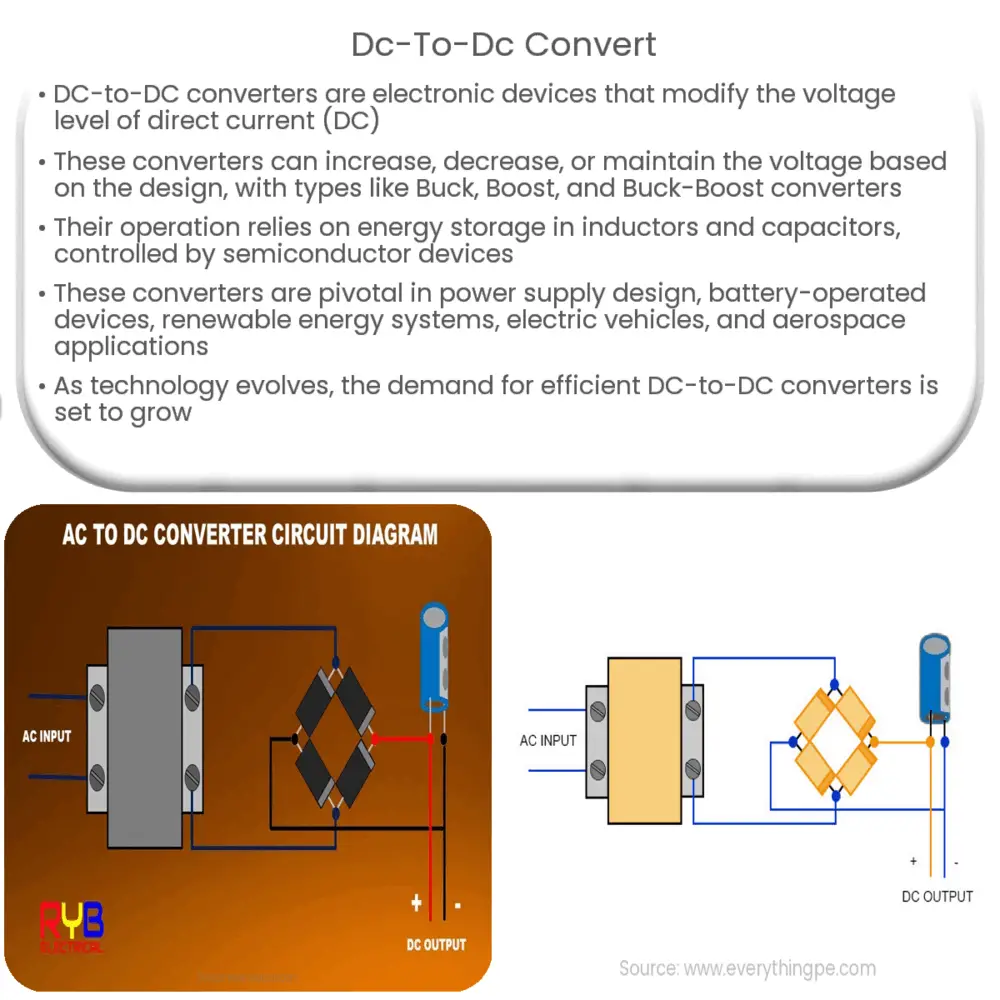Explore the fundamentals and applications of DC-to-DC converters in fields like power supply design, renewable energy, EVs, and aerospace.

Understanding DC-to-DC Conversion
Direct Current, or DC, is a type of electrical energy flow that consistently moves in a single direction. This type of current is typically found in batteries, fuel cells, solar cells, and certain types of power supply circuits. In some instances, there is a requirement to change the level of DC voltage, which brings us to the topic at hand: DC-to-DC conversion.
What is a DC-to-DC Converter?
A DC-to-DC converter is a device that accepts a DC input voltage and generates a DC output voltage. The output voltage can be either less than, equal to, or more than the input voltage magnitude. This process of conversion or transformation is accomplished via an electronic circuit.
Types of DC-to-DC Converters
- Buck Converter: Also known as a step-down converter, this type of DC-to-DC converter reduces the input voltage.
- Boost Converter: This is a step-up converter. It increases the input voltage to a higher output level.
- Buck-Boost Converter: This converter has the capability to either step-up or step-down the voltage, depending on the design and requirement.
Principle of Operation
The basic operation of these converters revolves around the principle of energy storage in inductors and capacitors. They function by repeatedly storing and releasing energy to the load, thereby maintaining the required output voltage. The switching action for this energy storage and release is controlled by semiconductor devices such as transistors.
Applications of DC-to-DC Converters
The primary application of DC-to-DC converters is to transform the voltage of a DC power source to a level that is suitable for a specific device or component. They play an integral role in various industries and technologies. Let’s look at a few key application areas:
- Power Supply Design: In modern electronic equipment, multiple voltage levels are often required. DC-to-DC converters make it possible to derive these levels from a single power source.
- Battery Operated Devices: For battery-operated devices such as laptops and smartphones, DC-to-DC converters are employed to maintain a steady voltage supply even as the battery voltage decreases over time.
- Renewable Energy Systems: In systems such as solar power or wind power installations, DC-to-DC converters are utilized to maximize power extraction and to interface the generated DC power with the power grid or load.
Electric Vehicles and Aerospace Applications
Electric vehicles (EVs) are another area where DC-to-DC converters are critically important. They are used to convert the high voltage from the vehicle’s battery to a lower voltage needed to power the lights, wipers, audio systems, and other electronic systems within the vehicle.
In the field of aerospace, these converters serve a crucial role as well. They help in converting the voltages in satellites and space probes, ensuring the optimal performance of these high-stake devices, where reliability and power efficiency are key considerations.
Design and Efficiency Considerations
Designing a DC-to-DC converter requires a balance between several key factors. These include efficiency, power density, cost, and reliability. Efficiency is a critical aspect of design as it determines how much of the input power is usefully converted to output power. Inefficient converters waste power as heat, which not only reduces overall performance but can also lead to thermal management issues.
The Future of DC-to-DC Converters
As technology continues to evolve, the demand for efficient and compact DC-to-DC converters is set to increase. In the realm of renewable energy and electric vehicles, the need for efficient power conversion is driving innovations in converter design and technology. Researchers are also exploring the use of advanced materials and switching techniques to boost converter efficiency and reduce their size.
Conclusion
In conclusion, DC-to-DC converters play a pivotal role in the realm of electronics and power management. These essential components ensure that devices and systems can operate effectively and efficiently, whether in the palm of our hand, on the road, or beyond our atmosphere. Their importance is set to grow as our reliance on technology deepens, and the need for energy-efficient solutions becomes even more pronounced. As technology advances, DC-to-DC converters will continue to be at the forefront, powering the devices and systems that shape our future.

